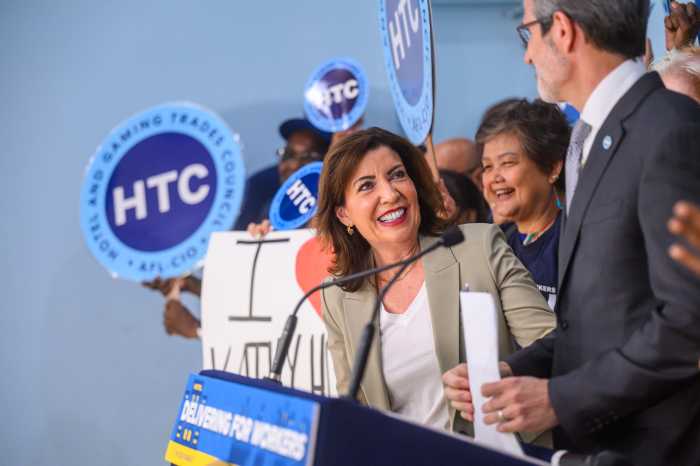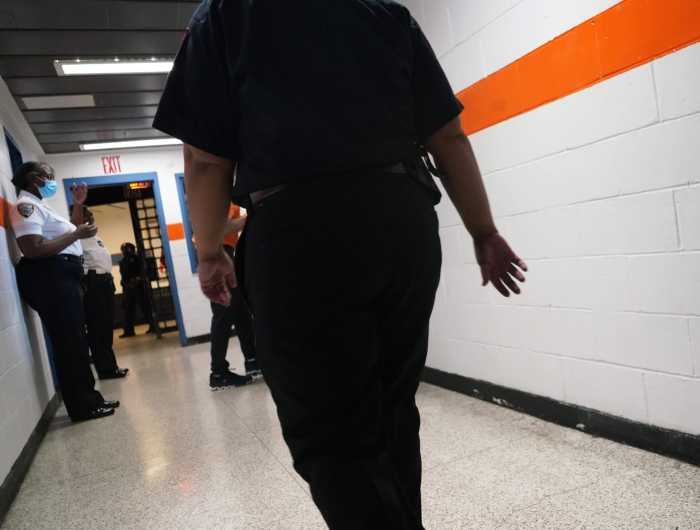New York politicians are stepping up their attacks on President Donald Trump’s proposed budget after more documents were released by the White House on Tuesday, May 23.
The Trump administration released budget documents on Tuesday, May 23, outlining a plan to slash $3.6 trillion in federal spending over the next decade.
Although the current form of the proposal, which aims to slash $3.6 trillion in federal spending over the next decade, is unlikely to pass in Congress, the documents make Trump’s budget priorities clear.
Aside from some new spending for the fiscal year 2018, including a $54 billion hike in military funding, the budget documents feature major cuts to government agencies, like the State Department and Environmental Protection Agency, which could have a direct impact on the city.
Mayor Bill de Blasio took to Twitter to voice outrage over Trump’s plan.
“The president’s budget is clearly written by millionaires and billionaires for millionaires and billionaires,” the mayor tweeted, on Tuesday, May 23.
De Blasio had blasted the Trump administration back in March after the president’s preliminary budget blueprint was released, saying the plan would have a “huge negative impact” on New York City. The budget could affect upcoming transit projects and counterterrorism efforts in the city, among other issues, according to the mayor.
Scroll down to find out where some of the issues most important to New Yorkers fell on Trump’s list of budget priorities.
Health care and Medicaid
Trump’s budget proposal includes a cut of more than $800 billion to the Medicaid program over the next 10 years.
The Medicaid reform plan seeks to “empower states to innovate and prioritize Medicaid dollars to the most vulnerable populations,” per the documents
But de Blasio denounced the proposed cuts on Twitter: “I don’t think it’s an exaggeration to say that yes, people will die from these cuts.”
If the proposal goes through as is, the city and state’s entire health care system could essentially be thrown into complete “disarray,” said Elisabeth Benjamin, vice president of health initiatives for the advocacy group Community Service Society.
“The budget proposal is ludicrous on its face. The math doesn’t add up,” Benjamin said, adding that there was “no way” the system could handle over a trillion dollars in cuts without the people of New York being negatively affected.
“If it were to go through, it would be nothing short of armageddon for kids, seniors, working and low-income people,” she added.
Medicaid isn’t the only health care issue on the chopping block. The city’s first lady, Chirlane McCray, released a statement slamming the budget’s lack of funding for mental health care.
“In the midst of the opioid epidemic, President Trump promised that he would connect those struggling with addiction to the treatment that will help them recover their lives. Instead, he proposes to break that promise and devastate our families,” McCray said in the statement. “These brutal cuts to mental health care, which has never been adequately funded, will cause widespread pain, put the lives of people in recovery at risk and exacerbate root challenges in education, public safety, criminal justice and homelessness.”
Environmental protections
Funding cuts to the Environmental Protection Agency are still a top priority for the Trump administration in this latest spending proposal, which looks to slash the agency’s budget by 30.4 percent.
The EPA’s net budget for the fiscal year 2017 was set at $8.2 billion, but if Trump gets his way, the agency’s budget for 2018 would be roughly $5.7 billion – a $2.5 billion drop in funding. Experts have suggested the move could have a negative impact on New York, from its drinking water to air quality and beyond.
Peter Iwanowicz, executive director of Environmental Advocates of New York, said Trump is “living up to the promise of dismantling the EPA.”
“If Congress doesn’t protect their constituents and reject the president’s plan, the results are clear — fewer cops on the beat, fewer doctors and scientists to keep people from getting sick, and more New Yorkers dying because of dirty air and water,” Iwanowicz said in a statement.
Counterterrorism
New York City stands to lose up to $190 million in counterterrorism funding under Trump’s most recent budget proposal, the mayor reiterated after the new documents were released.
More specifically, Sen. Charles Schumer pointed out on Memorial Day that the budget slashes funding for the Urban Area Security Initiative, known as UASI, from $605 million to $448 million. The senator said New York City allocates some of its UASI funds for FDNY and NYPD training.
“UASI is the lifeblood of New York’s anti-terror programs and the cornerstone of effective preparedness and prevention against terror threats,” he said. “At a time when terrorism is on the rise, we should not be cutting anti-terrorism funds that prevent costly and crippling disasters and more importantly, save lives.”
Police Commissioner James O’Neill has said proposed cuts to state and local grant funding budgeted under the Department of Homeland Security could impact the NYPD. The potentially lost federal counterterrorism money could be used to provide officers with tools and resources for extreme emergencies such as bomb threats, he said.
A request for comment from the NYPD on the new budget proposal was not immediately returned.
Trump’s budget proposal, according to Schumer, also eliminates the $25 million Non-Profit Security Grant, which gives non-profits and cultural and religious institutions money to protect against hate crimes, and decreases the State Homeland Security Grant Program from $467 million to $349 million.
Additionally, the spending plan cuts all funding to a Homeland Security program known as “countering violent extremism,” which provides grants to communities to counter radicalism through outreach.
The program, whose roots go back to the Obama administration, has come under scrutiny by the Trump administration and some congressional Republicans who favor law enforcement, rather than community outreach, to fight what they see as a growing Islamic extremist threat.
At the beginning of the administration, some White House and DHS officials considered changing the name of the program to “countering Islamic extremism,” and refocusing the funding only on grants that dealt with the Islamic community, not other communities that may have extremist views like white supremacists.
The funding cuts proposed by the budget would reduce the $50 million currently allocated for the program down to zero for fiscal year 2018.
Infrastructure
Although the budget proposal touts a target of $1 trillion in infrastructure investments – to be met by a combination of new federal funding and incentivized nonfederal funding – transportation advocates in New York were quick to point out the Trump administration has also proposed cutting infrastructure programs.
“At one time, the president talks about a trillion-dollar infrastructure plan and proposes cutting the programs we actually use to fund infrastructure,” John Raskin, executive director of the Riders Alliance, said in a statement. “The words and the reality don’t match.”
Trump plans to cut a total of $760 million in funding for Amtrak, which is responsible for the upkeep of the tracks and equipment at Penn Station. The budget also does away with the New Starts grant program, which Amtrak was counting on to get its $23 billion Gateway project off the ground.
Amid recent infrastructure-related commuting issues at Penn Station, Sens. Chuck Schumer and Kirsten Gillibrand said Trump’s proposed budget essentially doubles down on the crisis.
“Despite the many challenges we are facing at Penn Station, President Trump has just proposed to make it worse,” Schumer said. “President Trump’s campaign promises on infrastructure are crumbling faster than our roads, railways and bridges.”
Just days before Trump released his budget proposal, Gov. Andrew Cuomo had called on the president to consider Penn Station’s crumbling infrastructure an “emergency situation” and to provide federal funding to help Amtrak make critical repairs.
With Reuters, Newsday and Vincent Barone





































